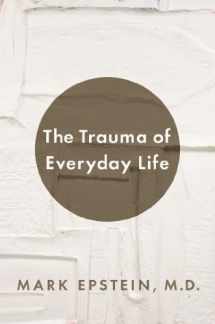
The Trauma of Everyday Life
ISBN-13:
9781594205132
ISBN-10:
1594205132
Author:
Mark Epstein
Publication date:
2013
Publisher:
Penguin Press
Format:
Hardcover
240 pages
FREE US shipping
Book details
ISBN-13:
9781594205132
ISBN-10:
1594205132
Author:
Mark Epstein
Publication date:
2013
Publisher:
Penguin Press
Format:
Hardcover
240 pages
Summary
The Trauma of Everyday Life (ISBN-13: 9781594205132 and ISBN-10: 1594205132), written by authors
Mark Epstein, was published by Penguin Press in 2013.
With an overall rating of 3.9 stars, it's a notable title among other
Psychology & Counseling
(Psychotherapy, TA & NLP, Mental Illness, Psychology, Pathologies, Psychotherapy, TA & NLP) books. You can easily purchase or rent The Trauma of Everyday Life (Hardcover, Used) from BooksRun,
along with many other new and used
Psychology & Counseling
books
and textbooks.
And, if you're looking to sell your copy, our current buyback offer is $0.53.
Description
A revolutionary reexamination of trauma’s role in the life journey, opening the door to growth and healing
Trauma does not just happen to a few unlucky people; it is the bedrock of our psychology. Death and illness touch us all, but even the everyday sufferings of loneliness and fear are traumatic. In The Trauma of Everyday Life renowned psychiatrist and author of Thoughts Without a Thinker Mark Epstein uncovers the transformational potential of trauma, revealing how it can be used for the mind’s own development.
Western psychology teaches that if we understand the cause of trauma, we might move past it while many drawn to Eastern practices see meditation as a means of rising above, or distancing themselves from, their most difficult emotions. Both, Epstein argues, fail to recognize that trauma is an indivisible part of life and can be used as a lever for growth and an ever deeper understanding of change. When we regard trauma with this perspective, understanding that suffering is universal and without logic, our pain connects us to the world on a more fundamental level. The way out of pain is through it.
Epstein’s discovery begins in his analysis of the life of Buddha, looking to how the death of his mother informed his path and teachings. The Buddha’s spiritual journey can be read as an expression of primitive agony grounded in childhood trauma. Yet the Buddha’s story is only one of many in The Trauma of Everyday Life. Here, Epstein looks to his own experience, that of his patients, and of the many fellow sojourners and teachers he encounters as a psychiatrist and Buddhist. They are alike only in that they share in trauma, large and small, as all of us do. Epstein finds throughout that trauma, if it doesn’t destroy us, wakes us up to both our minds’ own capacity and to the suffering of others. It makes us more human, caring, and wise. It can be our greatest teacher, our freedom itself, and it is available to all of us.
Trauma does not just happen to a few unlucky people; it is the bedrock of our psychology. Death and illness touch us all, but even the everyday sufferings of loneliness and fear are traumatic. In The Trauma of Everyday Life renowned psychiatrist and author of Thoughts Without a Thinker Mark Epstein uncovers the transformational potential of trauma, revealing how it can be used for the mind’s own development.
Western psychology teaches that if we understand the cause of trauma, we might move past it while many drawn to Eastern practices see meditation as a means of rising above, or distancing themselves from, their most difficult emotions. Both, Epstein argues, fail to recognize that trauma is an indivisible part of life and can be used as a lever for growth and an ever deeper understanding of change. When we regard trauma with this perspective, understanding that suffering is universal and without logic, our pain connects us to the world on a more fundamental level. The way out of pain is through it.
Epstein’s discovery begins in his analysis of the life of Buddha, looking to how the death of his mother informed his path and teachings. The Buddha’s spiritual journey can be read as an expression of primitive agony grounded in childhood trauma. Yet the Buddha’s story is only one of many in The Trauma of Everyday Life. Here, Epstein looks to his own experience, that of his patients, and of the many fellow sojourners and teachers he encounters as a psychiatrist and Buddhist. They are alike only in that they share in trauma, large and small, as all of us do. Epstein finds throughout that trauma, if it doesn’t destroy us, wakes us up to both our minds’ own capacity and to the suffering of others. It makes us more human, caring, and wise. It can be our greatest teacher, our freedom itself, and it is available to all of us.


We would LOVE it if you could help us and other readers by reviewing the book
Book review

Congratulations! We have received your book review.
{user}
{createdAt}
by {truncated_author}


